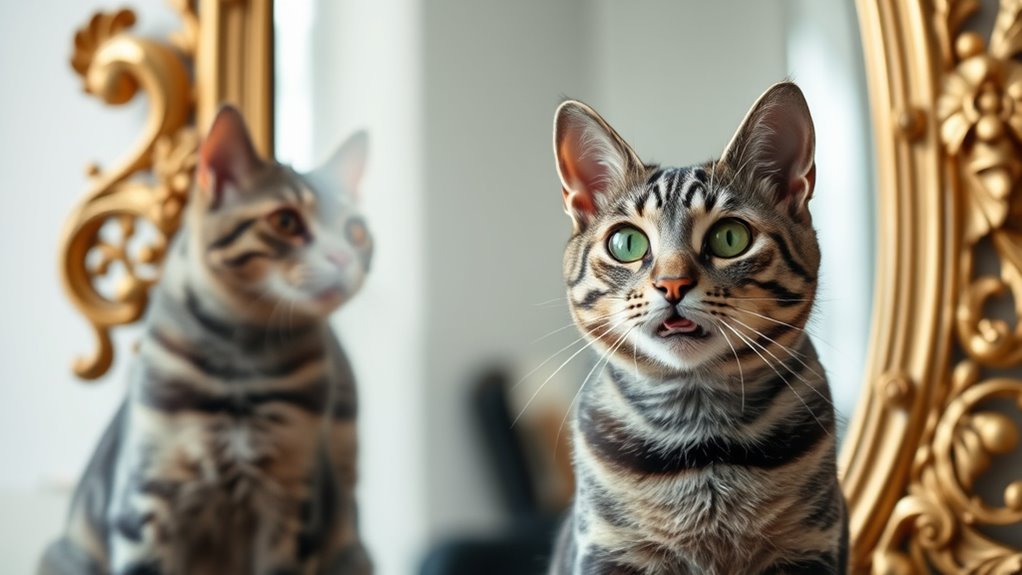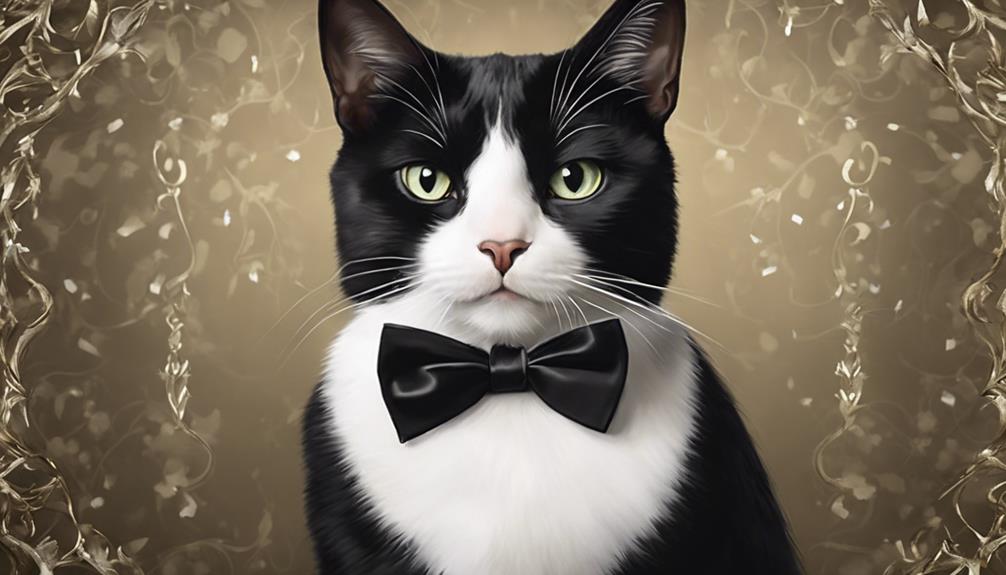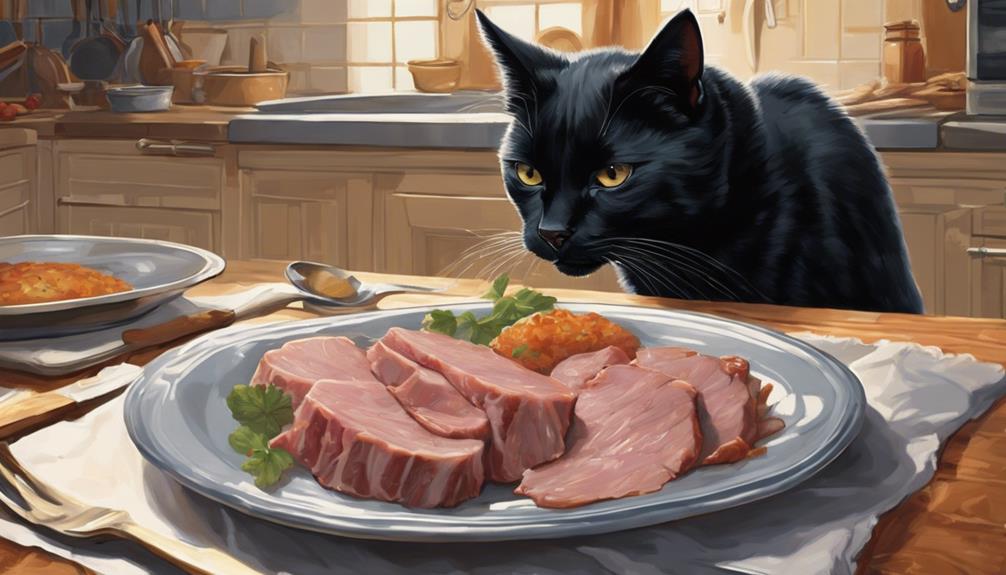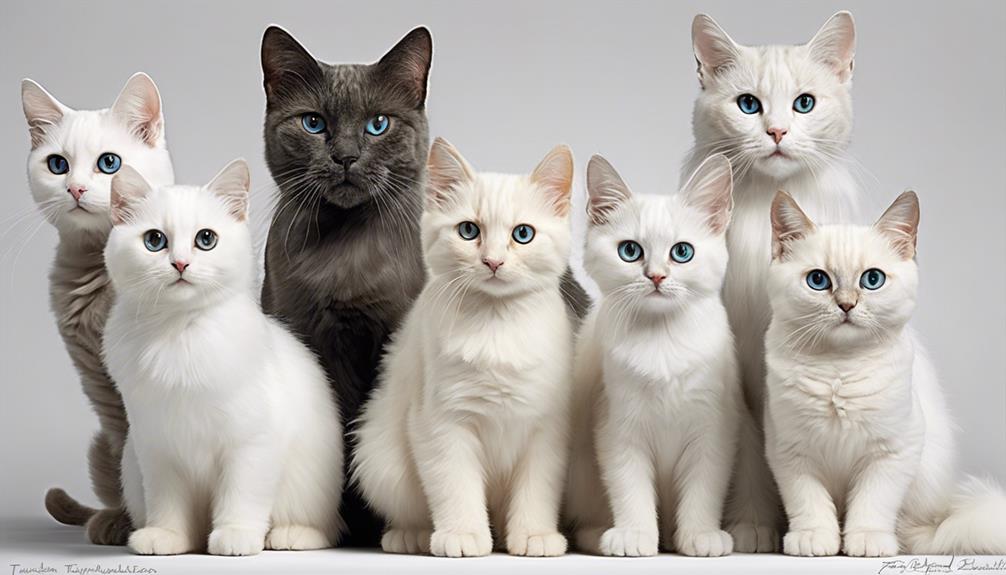A recent study shows that cats often mirror their owners’ accents when meowing, revealing they can learn and adapt their vocalizations based on their environment. This behavior isn’t accidental but a form of social learning that strengthens your bond. By listening to your speech patterns, cats subtly imitate your tone, pitch, and rhythm. If you continue exploring, you’ll uncover how these vocal habits reflect both animal intelligence and the influence of cultural surroundings.
Key Takeaways
- Cats adapt their meow pitch, tone, and rhythm based on their owner’s accent and speech patterns.
- Vocal mimicry in cats results from social learning and environmental influences, not conscious imitation.
- This behavior enhances social bonding and improves communication between cats and their owners.
- Accent-mirroring demonstrates cats’ surprising vocal flexibility and ability to learn from their surroundings.
- The phenomenon highlights how cultural and linguistic environments shape animal communication behaviors.
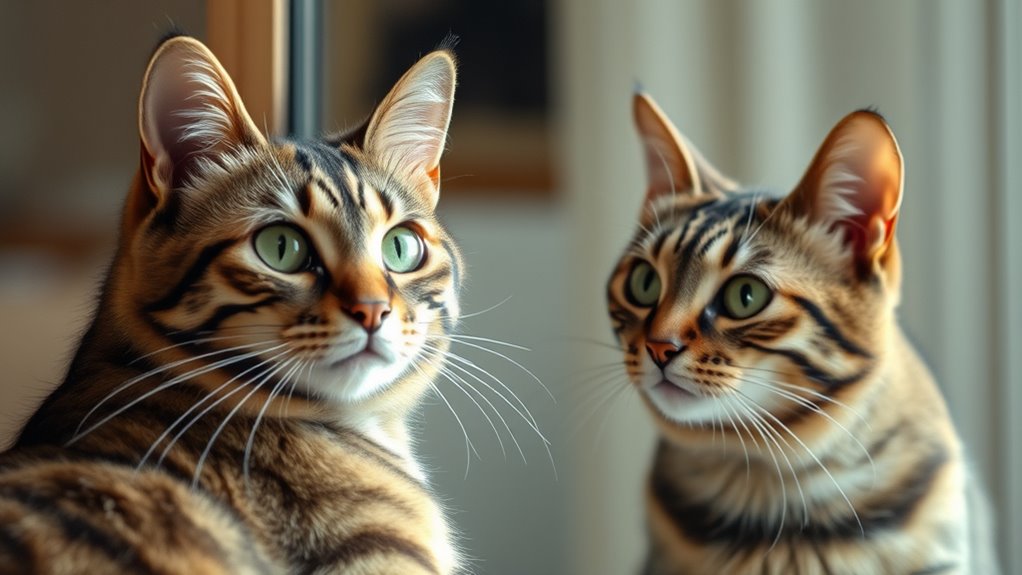
Have you ever noticed that your cat’s meow seems to sound just like your accent? It’s a curious phenomenon that has fascinated pet owners and scientists alike. Recent research suggests that this isn’t just a coincidence but may be rooted in the way cats learn and adapt their vocalizations through cultural influence and vocal learning. When you speak, your accent is shaped by your environment, community, and social interactions. Over time, these influences become embedded in your speech patterns, and it appears that cats pick up on these subtle cues, mirroring them in their own way when they meow.
Vocal learning is a key aspect of this process. Unlike many animals that have fixed calls, cats demonstrate a surprising ability to modify their vocalizations based on their surroundings. They listen carefully to the sounds they hear daily—your voice, household noises, and even other cats—and gradually adapt their meows to match the tone, pitch, and rhythm of your speech. This isn’t conscious imitation but a form of social adaptation. Cats are highly perceptive creatures, and they seem to recognize that mimicking their owners’ vocal style can strengthen their bond and improve communication. In essence, their meows become a reflection of the linguistic environment they’re immersed in.
Cats adapt their meows by listening to and mimicking their environment, enhancing bonds and communication.
Understanding this connection highlights the remarkable interplay between culture and communication in the animal kingdom. It underscores that cats aren’t just passive recipients of your words; they’re actively learning and adapting, demonstrating a form of vocal learning that’s surprisingly sophisticated. Your accent, your speech patterns, and the sounds you produce are all influencing your feline friend’s own way of expressing themselves. Vocal learning is a crucial factor in this process, revealing how animals can pick up on complex social cues. So next time your cat meows, pay attention—there’s a good chance it’s echoing your own unique linguistic signature, a testament to how deeply cultural influence and vocal learning shape even the most unexpected aspects of animal behavior.
Frequently Asked Questions
Do All Cats Imitate Their Owners’ Accents When Meowing?
You might wonder if all cats imitate their owners’ accents when meowing. While some cats display vocal mimicry through linguistic adaptation, not every cat does so consistently. Factors like personality, environment, and individual differences influence this behavior. So, even if your cat occasionally adapts its meow to your accent, it’s not a universal trait. Each cat’s vocal repertoire varies, making their meowing unique to their experiences.
How Quickly Do Cats Adopt Their Owner’s Accent?
Imagine your cat catching onto your vocal style like a catchy tune. When it comes to vocal imitation and linguistic adaptation, cats can pick up on your accent surprisingly fast—sometimes within just a few days. They subtly mirror your meowing tone, showing their keen awareness. So, if you notice your feline adopting your accent quickly, it’s their way of staying connected and showing affection through this charming linguistic dance.
Can Cats Learn Multiple Accents From Different Owners?
You might wonder if cats can learn multiple accents from different owners. Thanks to vocal mimicry, cats are capable of accent adaptation, adjusting their meows to match each person they interact with. They actively listen and imitate the unique sounds of each owner, which means they can indeed learn multiple accents over time. Your cat’s ability to adapt shows their impressive capacity for vocal mimicry and social learning.
Does a Cat’s Meow Change Based on Its Mood or Environment?
Imagine a chameleon blending into its surroundings—that’s how your cat’s meow adapts. Yes, their vocal adaptability shifts with mood and environment. When happy, they purr softly; when anxious, they might yowl loudly. Environmental influence, like unfamiliar sounds or stress, triggers these changes. Your cat’s meow isn’t static; it’s a dynamic language that reflects their feelings and surroundings, making each meow a tiny story of their current world.
Are Certain Breeds More Likely to Mirror Accents Than Others?
Certain breeds influence vocal diversity, making some cats more likely to mirror owner accents than others. You might notice that breeds known for their expressive meows, like Siamese or Bengal, adapt their sounds more readily. While all cats can mirror their owner’s accents, these breeds tend to have a greater tendency due to their vocal characteristics, allowing them to pick up and reproduce the nuances of your speech more effectively.
Conclusion
So, next time your cat meows, remember it’s not just random noise—it’s like hearing a tiny echo of your own voice. Just as a mirror reflects your face, your feline friend mirrors your accent, creating a unique language between you both. It’s a sweet reminder that, like a dance partner, your cat tunes into your rhythm and style. So, enjoy these little conversations; they’re your pet’s way of saying, “I’m part of your world.”
